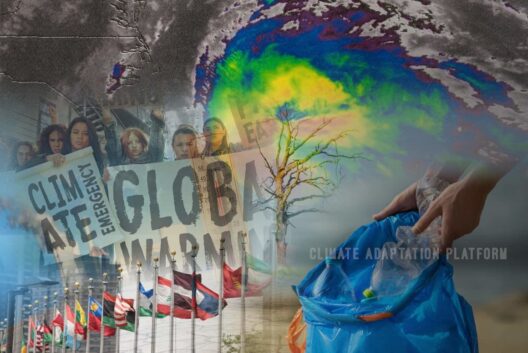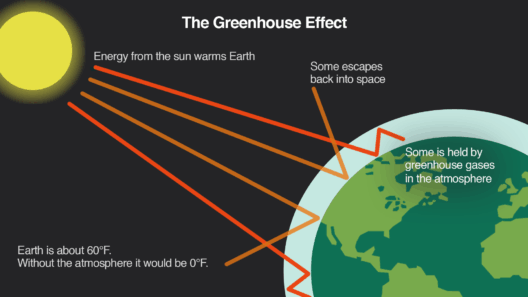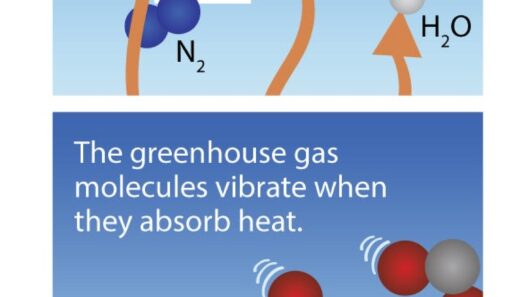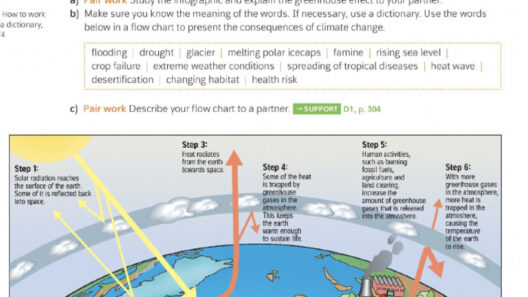Imagining a world devoid of the greenhouse effect presents a compelling thought experiment that tantalizes the imagination. As we contemplate the conditions that would arise in such a reality, it becomes evident that the delicate balance of our climate system is paramount for sustaining life as we know it. The greenhouse effect, a natural and essential phenomenon, acts as a regulation mechanism that ensures Earth remains habitable. What would occur if this mechanism were to be entirely absent? The implications are profound and strikingly illustrative of our planet’s fragility.
To truly grasp the gravity of this scenario, it is vital to first comprehend what the greenhouse effect entails. At its core, this process involves the trapping of heat in the Earth’s atmosphere by greenhouse gases such as carbon dioxide, methane, and water vapor. This trapped heat keeps the planet warm enough to support life, preventing the extreme temperature fluctuations that would otherwise occur. Without this insulation, we would be faced with a dramatically transformed Earth, one where survival would become increasingly untenable.
The Direct Consequences of Zero Heat Retention
In a world absent of the greenhouse effect, the first and most immediate consequence would be a catastrophic drop in global temperatures. The average surface temperature of Earth currently hovers around 59 degrees Fahrenheit (15 degrees Celsius), a figure that belies the extremes of day and night that are experienced in various locations. Without the insulation provided by greenhouse gases, average temperatures could plummet by as much as 60 degrees Fahrenheit (33 degrees Celsius). Such a decline would not only render many regions inhospitable but would also create a frozen landscape reminiscent of the very coldest realms on the planet.
Regions currently characterized by temperate climates—think of the lush vineyards of California or the rolling hills of Italy—would be transformed into barren wastelands. Biodiversity, already under considerable strain due to human activities, would suffer detrimental effects. Many species of flora and fauna would struggle to adapt to such dramatic changes, leading to widespread extinctions. The intricate web of ecosystems that depend on specific climate conditions would unravel, resulting in a cascade of ecological failures.
The Impact on Water Systems
Water systems would undergo profound alterations as well. With a significant drop in temperature, the hydrological cycle would be severely disrupted. Lakes, rivers, and reservoirs would be prone to freezing, leading to reduced freshwater availability. Agricultural practices would falter as crops that hinge on moderate temperatures and a dependable growing season would be obliterated. The ramifications for food security would be dire, exacerbating hunger and malnutrition on a global scale. Countries reliant on agriculture for economic stability would find themselves in an untenable position, necessitating urgent adaptation strategies.
Atmospheric Dynamics and Extreme Weather
In addition, the absence of the greenhouse effect would precipitate a tumultuous shift in atmospheric dynamics. The balance of pressure systems would be perturbed, potentially leading to an increase in extreme weather events. Polar regions, which would still experience seasonal variations, might see a perpetuation of enormous storm systems that contrast sharply with the overall colder climate. Sudden snowstorms could become frequent, perpetuating further challenges for any remaining human populations.
Retracing the Steps of Evolution
Life as we know it has meticulously evolved under the influence of the greenhouse effect. The delicate interactions between temperature and living organisms have shaped the contours of ecosystems over millennia. With a frigid world bereft of heat retention, the evolutionary narrative would take a different trajectory altogether. Some species might adapt through rapid evolutionary processes, while others–especially those requiring stable climates–would inevitably face extinction. It poses an intriguing paradox: in an attempt to imagine life without the greenhouse effect, we ultimately confront the question, what is life in the absence of adaptation?
Societal Implications and Human Resilience
Human societies are intricately bound to climate systems, reliant on predictable weather patterns for agriculture, infrastructure, and overall livelihoods. The collapse of familiar climates would likely precipitate massive migrations as populations flee from inhospitable regions in search of warmth and sustenance. Historical precedents of mass migrations suggest that societal structures might fracture under the weight of these stresses, leading to potential conflict over dwindling resources.
However, within this bleak narrative of a world without the greenhouse effect lies a testament to human ingenuity. The challenges posed by extreme climate scenarios could catalyze remarkable resilience and adaptation strategies. Innovative technologies could emerge to address the necessity for warmth and sustainable food sources, although these solutions often come with their own environmental costs. The potential for a deepened commitment to sustainability arises as we grapple with what we stand to lose in the absence of functioning ecosystems.
The Importance of Climate Awareness
As we ruminate on a world devoid of the greenhouse effect, it becomes increasingly apparent that maintaining the delicate equilibrium of our climate system is crucial. This thought experiment serves as a reminder of the importance of environmental stewardship, urging us to recognize the interdependence of life and climate. The greenhouse effect might often be perceived as a burden when exacerbated by human emissions, yet it is fundamentally a natural ally in maintaining a hospitable planet.
In conclusion, imagining a world without the greenhouse effect ignites a critical dialogue about our relationship with the planet. It challenges us to consider our impact on the climate system and highlights the urgent need for collective action to preserve the complex tapestry of life that makes Earth uniquely vibrant. Without conscious awareness and a commitment to sustainable practices, we risk venturing towards a daunting reality that may one day become all too tangible.







